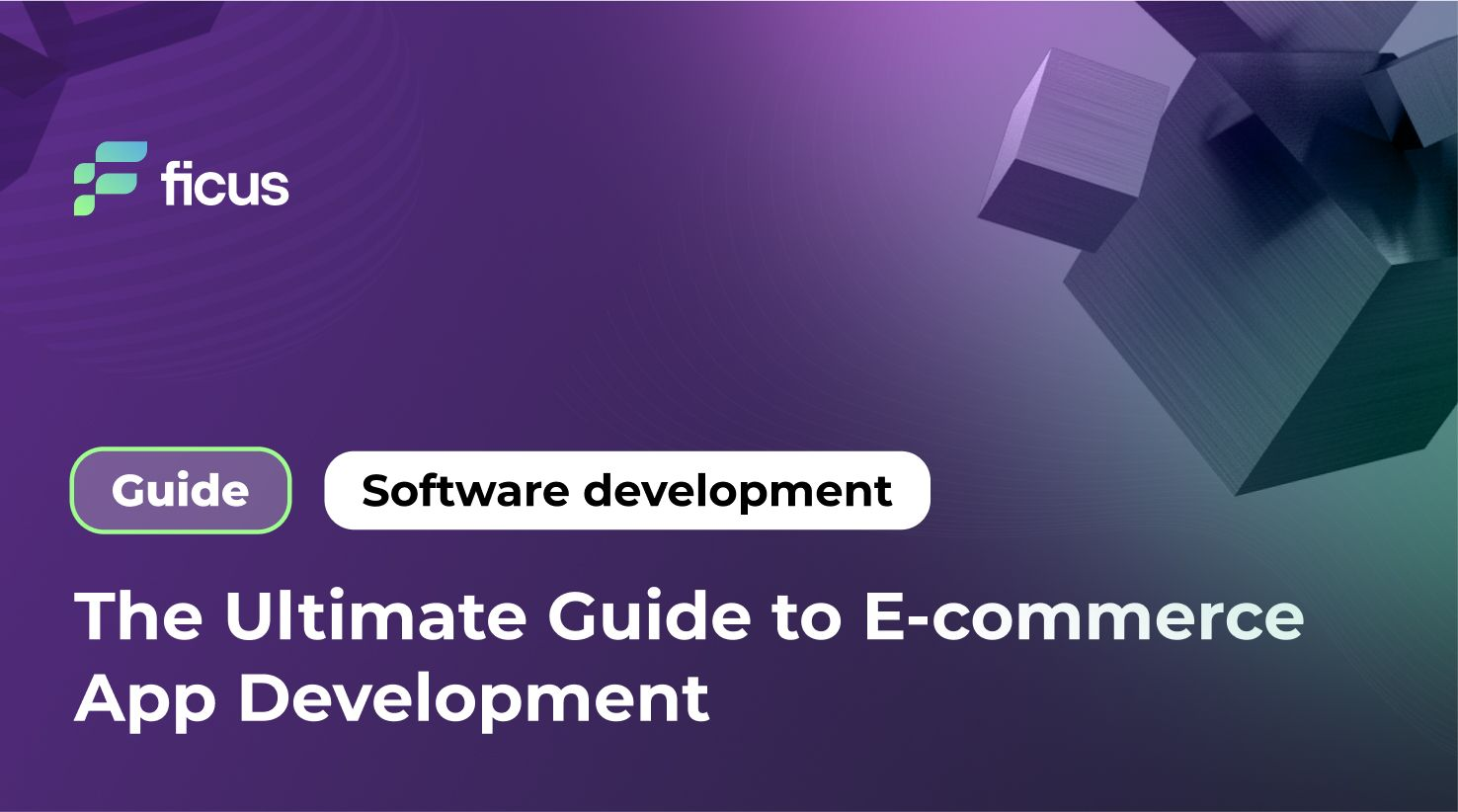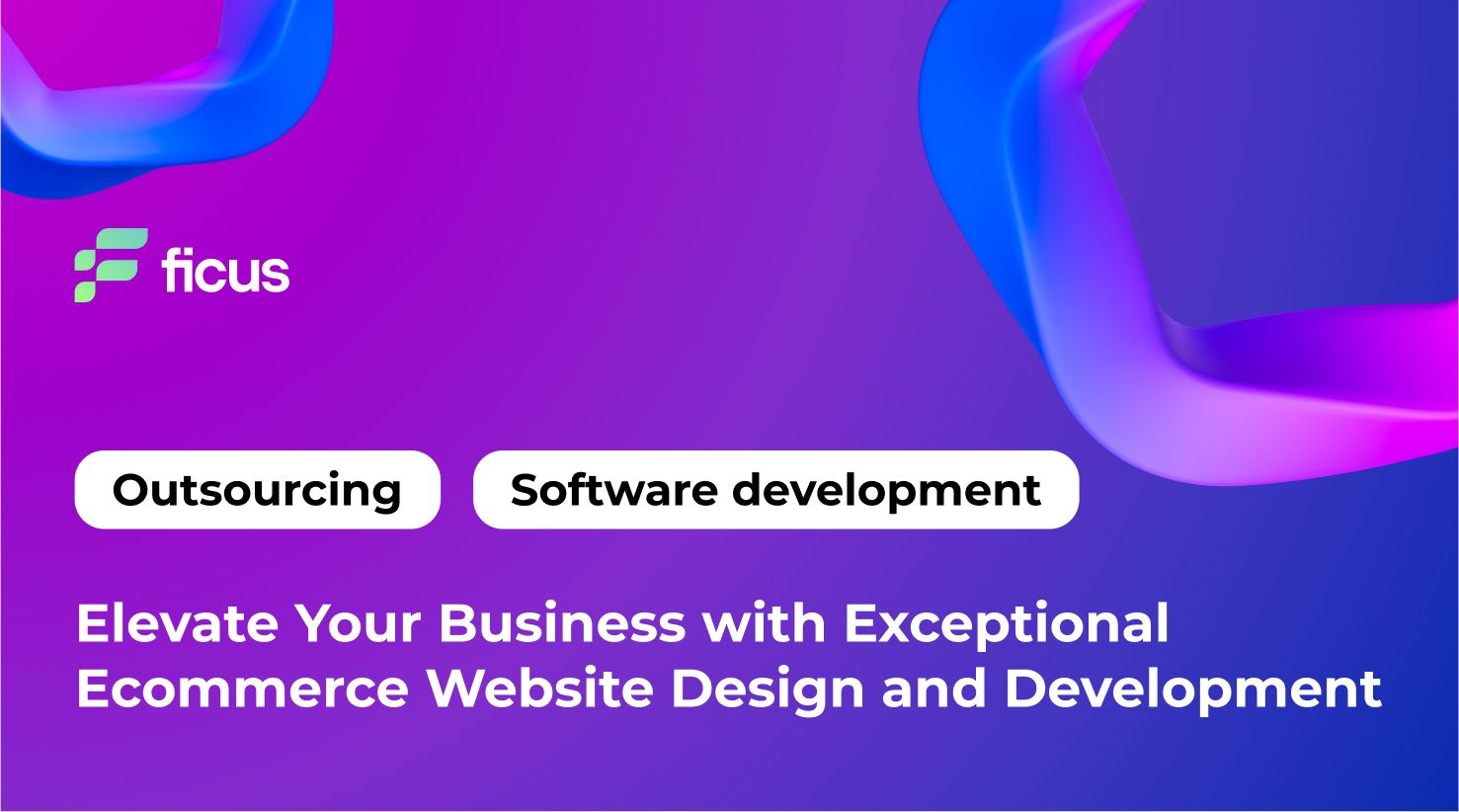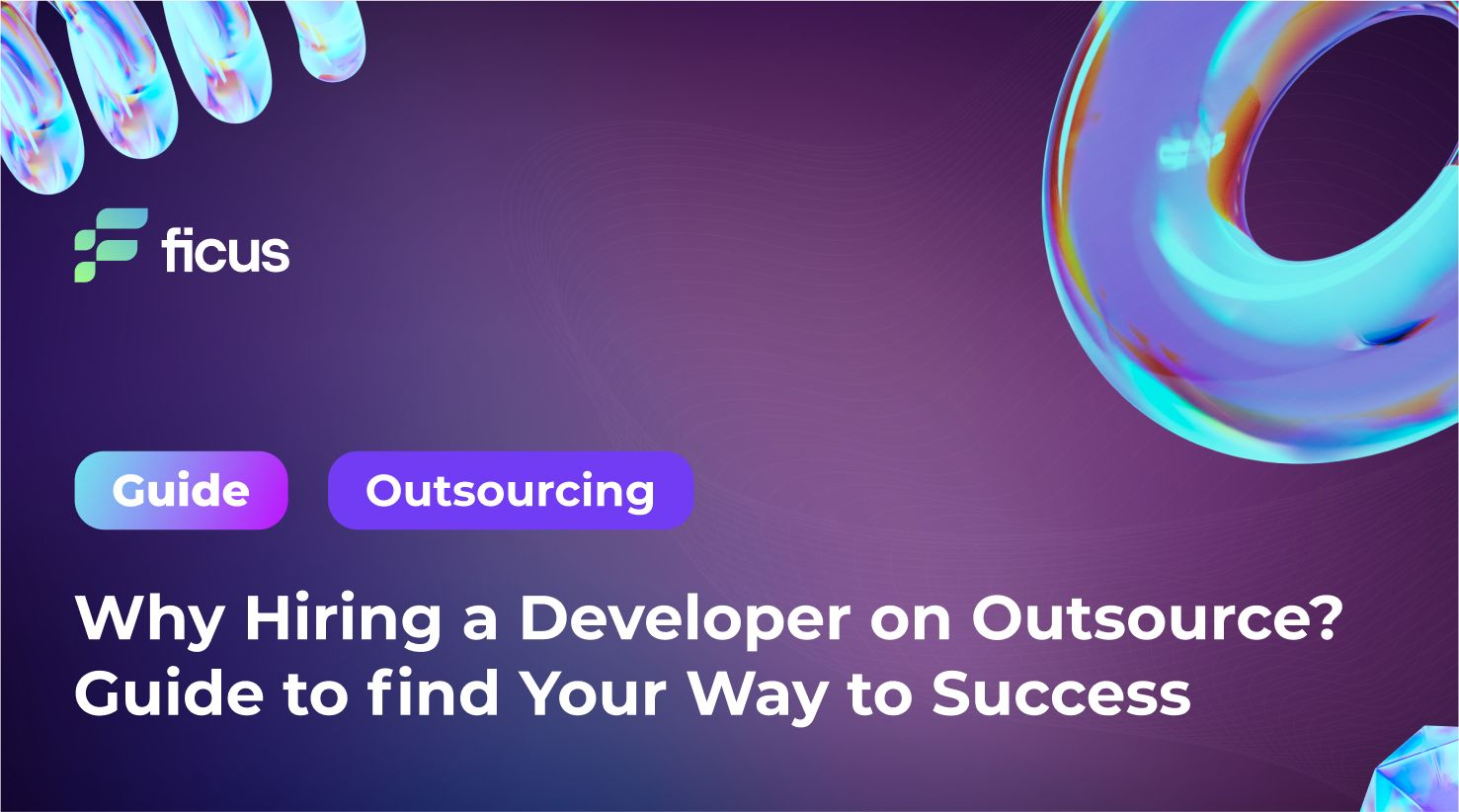In today’s fast-paced digital age, e-commerce has taken the world by storm. Everyone is racing to establish a solid online presence, from the smallest boutiques to retail giants. One of the most crucial aspects of this digital transformation is e-commerce app development. We will lead you through the entire process in this detailed tutorial on the ins and outs of creating an e-commerce app that attracts customers and boosts your sales. We’ll cover everything from the benefits of e-commerce apps to key features, development approaches, and the development process itself.
- E-commerce apps enhance convenience, sales, and customer engagement.
- Key features include user-friendly interfaces and secure payment options.
- Ficus Technologies can guide you in successful e-commerce app development.
The E-commerce Revolution
E-commerce has experienced an unprecedented surge in popularity over the past few years. This boom is driven by changing consumer behavior and a growing preference for online shopping. People may now easily purchase from the comfort of their homes thanks to cell phones, making e-commerce apps a necessity for any business looking to thrive in the modern marketplace.
Advantages of E-commerce Applications
In the dynamic landscape of e-commerce app development, businesses recognize the manifold advantages of embracing mobile commerce through e-commerce apps. The strategic integration of these apps into your retail and e-commerce app development can be a game-changer, revolutionizing your business in numerous ways.
Convenience: Enhancing the Mobile Shopping Experience
In e-commerce app development, convenience is the cornerstone of success. Creating an app that prioritizes convenience for mobile users involves several key considerations. Let’s delve deeper into how e-commerce app development can optimize the shopping experience and ensure a seamless journey for users.
When embarking on the journey of e-commerce app development, the primary focus should be delivering a mobile-centric design. This design approach ensures that the app functions flawlessly on smartphones and tablets, catering to the growing population of mobile shoppers. Mobile optimization is not merely a feature; it’s a fundamental aspect of the e-commerce app development process.
In order to enhance comfort, it’s crucial to streamline the user experience. This entails creating an app with intuitive navigation, swift loading times, and user-friendly search and filter options. A well-designed mobile e-commerce app development strategy minimizes user effort and encourages exploration of products, ultimately leading to more sales.
Real-time inventory management is another pivotal feature in ensuring convenience. No customer wants to be met with out-of-stock products when they’re ready to purchase. Implementing real-time inventory updates is a must-have in modern retail and e-commerce app development. It informs users about product availability and significantly reduces the likelihood of abandoned carts.
While embarking on e-commerce app development, businesses often face concerns about the initial e-commerce app development cost. The Minimum Viable Product (MVP) strategy can be used in this situation. By developing a simplified version of the app with essential features, you can quickly test the market and gather valuable user feedback. This feedback loop helps refine the app without breaking the bank, making it a strategic choice for those mindful of e-commerce app development costs.
Moreover, the journey of e-commerce app development doesn’t end with the app’s initial release. Continuous user feedback-based enhancement is a part of the continuing process. User suggestions and complaints should be taken seriously, as they provide insights into areas where convenience can be enhanced. Fueled by user feedback, regular updates, and iterations ensure the app remains relevant and user-friendly.
Increased Sales: Maximizing Revenue Through E-commerce Apps
The central goal of e-commerce app development is to boost sales and revenue. Achieving this objective involves combining strategic planning, enticing features, and leveraging the mobile platform. Here’s how e-commerce app development can help drive increased sales and revenue:
Expanding your business reach is an inherent advantage of mobile e-commerce app development. With ubiquitous smartphones, your app becomes a gateway to a global market. By embracing e-commerce app development for mobile devices, you can reach out to new types of customers reach customers in different regions, significantly expanding your reach and sales potential.
A fundamental aspect of driving increased sales through your app is leveraging features to encourage users to purchase. A secure and seamless payment process is paramount, instilling trust and confidence in your customers. In addition, providing detailed product descriptions, high-quality images, and user reviews empowers users with the information they need to make informed purchasing decisions. Offering special promotions or discounts exclusively to app users can serve as powerful incentives, enticing them to complete their transactions.
It’s essential to utilize analytics to understand user behavior to maximize sales. E-commerce apps have the advantage of tracking user preferences and shopping patterns. This data-driven approach enables you to offer personalized product recommendations, send targeted offers, and tailor your marketing strategies accordingly. Understanding user behavior is a cornerstone of driving increased sales and enhancing the overall effectiveness of your e-commerce app.
While the goal is to drive increased sales, it’s vital to consider the initial e-commerce app development cost. Building a well-designed and functional app requires an upfront investment, but the long-term benefits often outweigh the initial expenses. An efficiently executed app can become a primary revenue driver for your business, making the initial e-commerce app development cost a worthwhile investment in your company’s future growth.
Customer Engagement: Building Stronger Relationships Through E-commerce Apps
Building and maintaining strong customer relationships is pivotal to successful e-commerce app development. Customer engagement ensures that users make purchases and return for more, becoming loyal advocates for your brand. Here’s how to foster customer engagement through your app:
Fostering brand loyalty is a key goal of e-commerce app development. E-commerce apps provide a direct channel for businesses to engage with their customers. You may inform and engage your clients about your latest products, promotions, and news through push notifications, in-app messaging, and personalized offers. These interactions build brand loyalty and keep your user base connected to your business.
Encouraging repeat purchases is another significant aspect of customer engagement. Features like personalized product recommendations and loyalty programs incentivize users to return to your app for more shopping. These features increase sales and strengthen the bond between your brand and your customers.
Implementing a user-centric design approach is fundamental to effective e-commerce app development. Your app’s design and features should align with user preferences and behaviors. Conduct user testing and gather feedback to continually refine the user experience, making it more engaging and enjoyable.
Building trust through secure payment options is crucial for customer engagement. Trust is a foundational element of e-commerce. Implementing secure payment methods and prioritizing data protection reassure users that their sensitive information is safe. This trust-building measure can result in increased customer engagement and repeat business, contributing to the long-term success of your e-commerce app.
Core Characteristics of E-commerce Applications
Regarding e-commerce app development, incorporating the right features is crucial for success. Here are some key features that can make your app stand out:
User-Friendly Interface
A user-friendly interface is paramount in ensuring a positive shopping experience. Your app should be easy to navigate, with clear categories, product descriptions, and high-quality images. Customers may locate what they need quickly with the use of intuitive search and filtering tools.
Secure Payment Options
Online buyers’ primary priority is security. Gaining their trust requires your e-commerce app to offer secure payment options. Implementing industry-standard encryption and partnering with trusted payment gateways will reassure customers that their financial information is safe.
Inventory Management
Efficient inventory management is essential to prevent overselling or running out of stock. Your app should have real-time inventory tracking, automated alerts for low stock, and easy management tools for adding or removing products.
Selecting the Appropriate Development Strategy
When embarking on an e-commerce app development journey, choosing the right development approach is essential. Here are three common options:
Native Apps
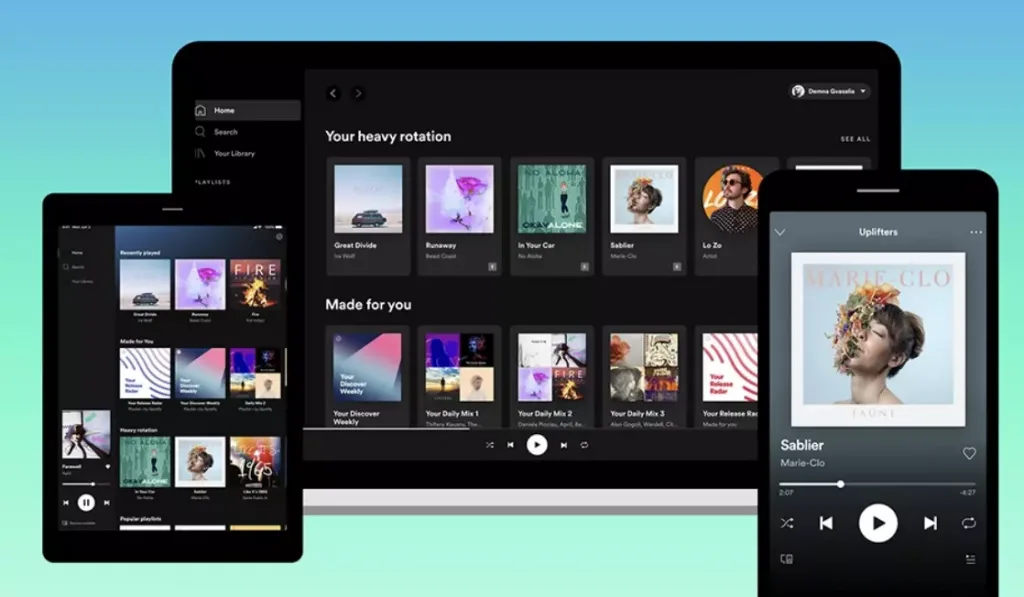
Specific platforms, such as iOS or Android, are the focus of native app development. They provide the finest user experience and performance but require separate development for each platform, increasing the e-commerce app development cost. Native apps are ideal for businesses with a substantial user base and budget.
Progressive Web Apps (PWAs)
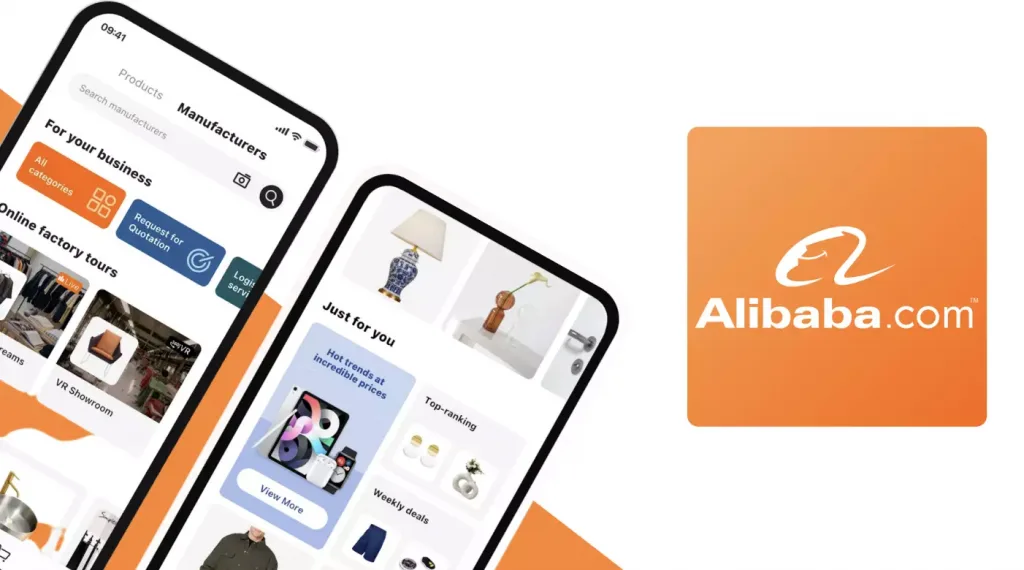
Web applications known as PWAs perform similar tasks as native apps. They are reachable through web browsers and can be installed on users’ home screens. PWAs offer cross-platform compatibility and cost-effective development but may have limitations in terms of performance and access to device features.
Hybrid Apps
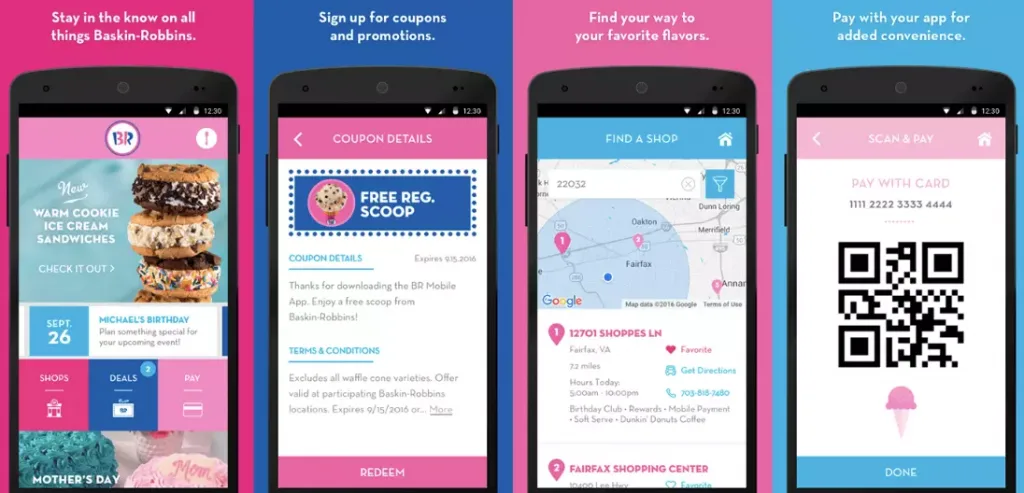
Native and web app components are combined in hybrid applications. They may be used on several platforms and are created utilizing web technologies, including HTML, CSS, and JavaScript. While hybrid apps offer cost savings and faster development, they may not provide the same level of performance as native apps.
The Process of Developing E-commerce Applications
Now that you understand the benefits, key features, and development approaches, let’s delve into the e-commerce app development process itself:
Planning
The planning phase serves as the bedrock of e-commerce app development. Businesses define their vision, target audience, and unique selling propositions here. Thorough product planning involves deciding which goods to offer and pricing strategies. It’s also the stage where the selection of key features begins, ensuring the user experience aligns with business goals. Analyzing the budget and e-commerce app development cost is equally critical to ensure the project’s financial viability. Additionally, adopting a mobile-centric approach is pivotal in today’s era of mobile e-commerce app development.
Design
User-centric design takes center stage in the design phase. It’s all about creating an app that attracts, engages, and satisfies users. Every design decision revolves around meeting user needs and preferences. The visual elements, including layout, color schemes, typography, and imagery, significantly shape the user experience. Wireframing and prototyping provide a clear roadmap for development, allowing for adjustments based on user feedback. Mobile responsiveness is also critical in mobile e-commerce app development, ensuring the app adapts seamlessly to various devices and orientations.
Development
Technical development brings the app to life. This phase involves coding, feature implementation, and meticulous attention to detail. Developers ensure that the app’s functionality aligns with the initial vision. Platform compatibility is considered, with both iOS and Android users in mind. Security and payment integration are paramount and offer strong protections for user data and financial transactions. The development phase transforms the design and plans into a functional e-commerce app.
Testing
Testing is the phase where the app’s performance and quality are scrutinized. Comprehensive testing examines functionality, performance, security, and usability. Bugs and issues are identified and addressed to ensure a flawless user experience. User feedback is actively incorporated during testing, offering valuable insights into usability and functionality. Once testing is complete, the app is ready for launch, but the journey doesn’t end there. Ongoing maintenance, updates, and responsiveness to user feedback are vital for long-term success in retail and e-commerce app development.
Ready to boost your e-commerce presence? How can Ficus Technologies assist you?
Contact UsConclusion
Creating e-commerce applications has become essential for companies hoping to flourish in this digital era, given the constantly changing e-commerce market, where convenience, improved sales, and client involvement reign supreme. As we explored the key phases of e-commerce app development—from planning and design to development and testing—it’s evident that a well-executed app can be a game-changer for businesses.
The e-commerce boom has reshaped businesses’ operations, with e-commerce apps leading the charge. These apps offer unparalleled convenience for mobile users, enhancing their shopping experience through carefully designed features and a user-friendly interface. The result? Increased sales and customer engagement are the lifeblood of any successful e-commerce venture.
The key features of e-commerce apps, including user-friendliness, secure payment options, and efficient inventory management, play a pivotal role in driving these benefits. Furthermore, choosing the right development approach, whether it’s native apps, Progressive Web Apps (PWAs), or hybrid apps, can significantly impact the success of your e-commerce app development project.
At Ficus Technologies, we understand the intricacies of e-commerce app development. We take pride in our team of experts who are well-versed in the nuances of mobile e-commerce app development and the intricacies of retail and e-commerce app development. Our commitment to user-centric design, robust security, and efficient feature implementation ensures that your app meets and exceeds your target users’ expectations.
If you’re looking to embark on an e-commerce app development journey, Ficus Technologies will guide you every step of the way. We understand the importance of balancing e-commerce app development cost with quality, and our approach, driven by MVP principles, ensures cost-effectiveness without compromising on excellence. We specialize in crafting apps that seamlessly integrate with your business model, enabling you to showcase your goods effectively in the online marketplace.
Furthermore, our commitment to ongoing improvement, driven by user feedback, ensures that your e-commerce app remains competitive and ahead of the curve. As you navigate the dynamic world of e-commerce, trust Ficus Technologies to be your partner in achieving success through e-commerce app development.
The choice of payment gateways significantly influences the success of an e-commerce app. A seamless and secure payment process is paramount for user trust and satisfaction. The selected payment gateways should align with customer preferences and offer diverse options, including credit cards, digital wallets, and other popular methods. Additionally, efficient payment gateways contribute to a reduction in cart abandonment rates, ensuring a positive user experience. Trustworthy and widely recognized payment gateways enhance the credibility of the e-commerce app, fostering customer loyalty and repeat business, ultimately driving the app’s overall success.
Yes, e-commerce apps can be seamlessly integrated with existing business systems and platforms. Modern e-commerce solutions are designed to offer flexible integration capabilities, allowing smooth connections with various business systems such as inventory management, customer relationship management (CRM), and order processing. Application Programming Interfaces (APIs) facilitate the interaction between the e-commerce app and other systems, ensuring data synchronization and real-time updates. This integration enhances operational efficiency, provides a holistic view of business processes, and enables businesses to leverage the full potential of their existing systems while expanding their online presence through the e-commerce app.
